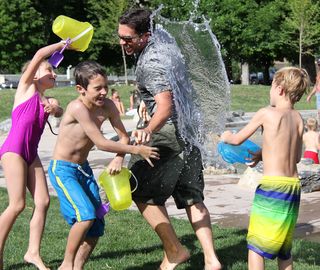Parenting
Parenting in the Age of Affirmative Consent
Let's teach kids that consent applies to more than just sex
Posted June 16, 2016
Twenty-five years ago, Antioch College in Ohio became the first college in America to require ongoing verbal affirmation during sexual encounters. Many viewed the initiative as political correctness gone too far. The school was even parodied on Saturday Night Live. Since then, multiple states have adopted a law called “Yes means Yes” to ensure an affirmative, unambiguous standard of consent for sexual contact.

As a college professor, I have seen Title IX compliance sweep through our campus this year like a hot wind, ruffling feathers and causing confusion among students and faculty who have recently completed mandated sexual surveys. Campus awareness efforts are a start, but in order to really change the culture at our institutions of higher learning, students need to know what consent looks like years before they’re sexually active—not just how to ask for consent, but also how to give consent.
If we wait to start the conversation when our kids are eighteen, we’re too late. Accountability, empathy, and self-control are what foster prosocial behavior. These qualities need to be taught early and often so that our kids develop respect for others, which is the key to understanding the nature of consent.
Using affirmative consent as a parenting tool means we have to get our children talking to us and each other about uncomfortable things. It’s not enough to watch body language or infer from social cues. Our children not only must learn how to say “Do you want to play King of the Mountain?” before shoving another child off the sand heap, they must also be okay with a “no.”
If they get in the habit of asking for consent when they’re young, it will help them later, when they need to navigate the muddled mess of adolescence and young adulthood. Teens considering a potential sexual encounter may wonder “How do you even start a conversation like this?” The answer is practice, preferably first with a situation that isn’t so emotionally weighted.
With our focus on academic achievement we seem to have forgotten that our kids need to learn and practice social skills. This means teaching them how to interact with others in a respectful and empathetic way. When we relegate affirmative consent to a world of sexual interactions, where we invoke it as a way to cover our backsides and keep out of hot water, we ignore what a powerful social tool affirmative consent actually is. Affirmative consent is not just about sex. It’s about regard for others, a principle that should be taught and reinforced when our kids are very young.

Let’s get it in preschools, in high schools, let’s practice it in our homes. When it comes to personal contact, kids need to understand that consent is part of the equation. They need to know that whether they’re twirling the ponytail of the girl sitting in front of them, dumping a bucketful on a sibling in a water fight, or receiving a giant hug from Aunt Beckie, consent must be obtained.
From a moral perspective, consent not only protects people from unwanted trespassing upon body and property, but it allows us to define our boundaries. “Yes means Yes” is a way of maintaining social balance, teaching the more assertive kids to be considerate of others, and giving control and confidence to the kids who are more passive and diffident.
American parents were horrified as they read the news about the Stanford rape case. The thought that the young woman, dragged unconscious behind a dumpster and sexually violated, could be our own daughter paralyzes us with fear. Equally staggering is the idea that the young man who committed the rape could be our son. Whether or not Brock Turner owns his actions, he’s the responsible party—not the alcohol and not his parents.
As parents, we do have a profound influence on our children’s moral development. It’s our responsibility to teach them not only right from wrong, but to make sure we’re constantly reinforcing prosocial behavior. When parents are fixated on their children’s academic and athletic success, they may inadequately or inadvertently forget to truly teach them how to be respectful, kind, and compassionate.
We may never know how Brock Turner’s parents raised him, but we can infer from his father’s letter to Judge Aaron Persky that the focus was on academics and athletics. Did they fail to reinforce the importance of self-control and empathy? In the end, it isn’t the intentions of Brock’s parents that matter. It’s what they did or didn’t do.
It’s time for us to make sure our children are practicing how to be good people, not just how to be exceptional students or athletes. We cannot wait until something terrible happens to teach our kids that affirmative consent is not just an edict that governs sexual relations. It’s a way of governing ourselves.
Bibliography
Dougherty, T. (2014). Fickle consent. Philosophical Studies, 167(1), 25-40. doi:http://dx.doi.org/10.1007/s11098-013-0230-7
http://affirmativeconsent.com/affirmative-consent-laws-state-by-state/
https://www.documentcloud.org/documents/2852614-Letter-from-Brock-Turne…
L’Ecuyer, C. (2015). The Wonder Approach to Learning. Habits: plasticity, learning and freedom.
Larrivee, D., & Gini, A. (2014). Is the philosophical construct of “habitus operativus bonus” compatible with the modern neuroscience concept of human flourishing through neuroplasticity? A consideration of prudence as a multidimensional regulator of virtue. Frontiers in Human Neuroscience, 8, 731. http://doi.org/10.3389/fnhum.2014.00731
Miller, F., & Wertheimer, A. (Eds.). (2009). The ethics of consent: theory and practice. Oxford University Press.




